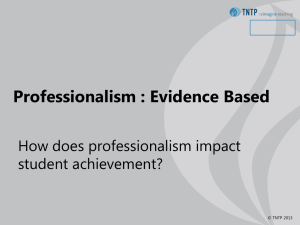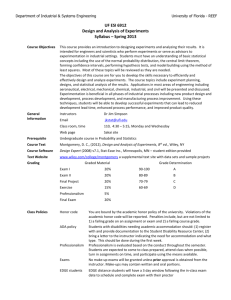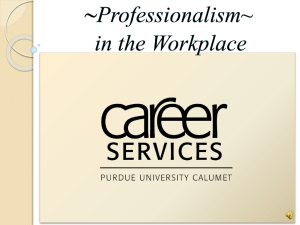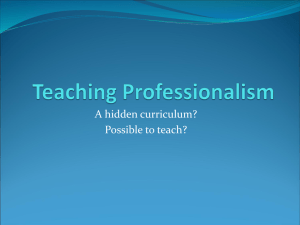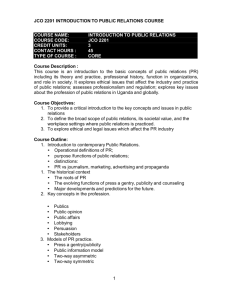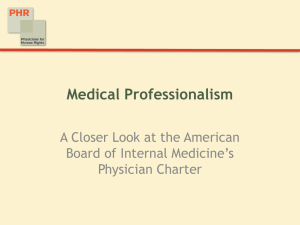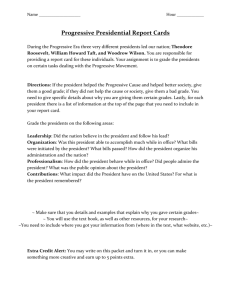The Management of Professionalism: a contemporary paradox
advertisement
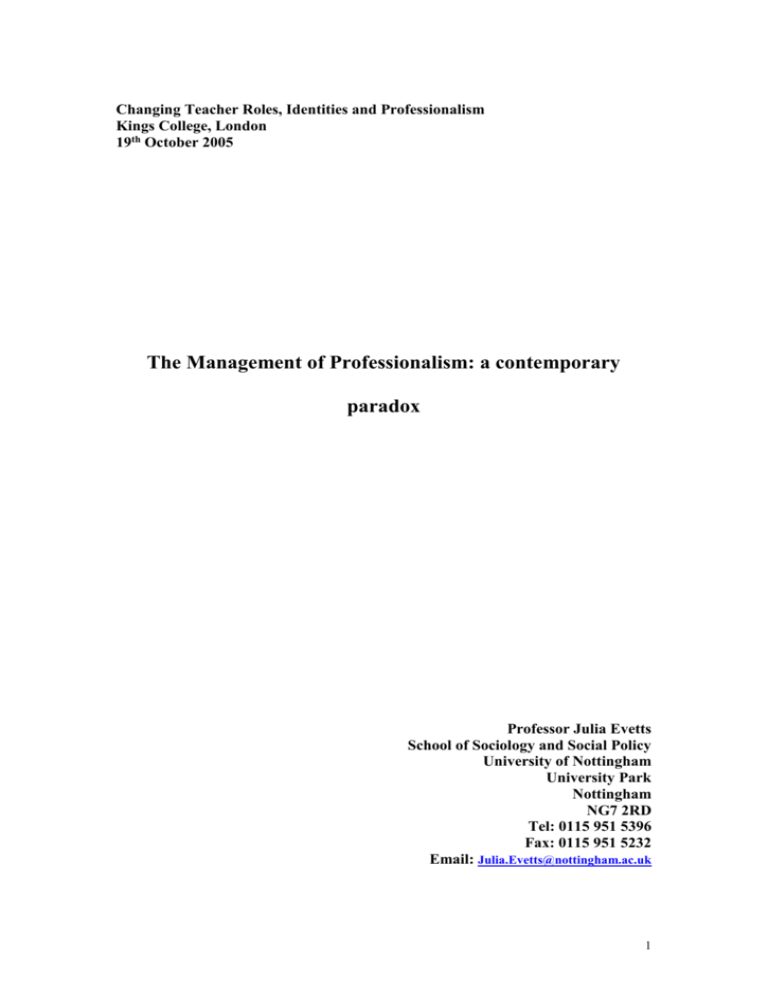
Changing Teacher Roles, Identities and Professionalism Kings College, London 19th October 2005 The Management of Professionalism: a contemporary paradox Professor Julia Evetts School of Sociology and Social Policy University of Nottingham University Park Nottingham NG7 2RD Tel: 0115 951 5396 Fax: 0115 951 5232 Email: Julia.Evetts@nottingham.ac.uk 1 The Management of Professionalism: a contemporary paradox The concepts of profession and ‘professionalism’ are increasingly applied to work and workers in modern societies. Yet the conditions of trust, discretion and competence which historically have been deemed to be necessary for professional practice are continually being challenged, changed or ‘regulated’. This represents a contemporary paradox which it is important to clarify and understand. As a sociologist of professional groups, I have been interested in knowledge-based occupational groups other than medicine, health and law (usually taken to be the key or archetypal professional groups). I have done research and published papers on head teachers, engineers and scientists working for industrial organizations, bankers in commercial organizations, the armed forces, journalists and most recently social workers and foster carers. Clearly this focus will have affected and influenced my interpretation. Knowledge–based occupations I take to be the expanding employment categories and the growth sectors of labour markets in developed (Lyotard 1984, Perkin 1988, Reed 1996, Frenkel et al 1995), transitional (Buchner-Jeziorska 2001, Buchner-Jeriorska and Evetts 1997) and developing societies (Hiremath and Gudagunti 1998, Sautu 1998). The concept of ‘profession’ is not used as often outside the Anglo-American literature where it represents the category of privileged, high status, high income occupational groups. In most societies the expansion of knowledge-based work and occupations is connected with the growing capacity of higher education systems to 2 produce workers who are educated and trained, and the needs of employers and managers in organisations to exercise control over knowledge and service work. I have argued for a shift in analytical focus, away from the concepts of profession and professonalization and instead to encourage further analysis of the concept of professionalism and how it is being used. Of more interest and relevance in current work and employment contexts is the increased use of the discourse of professionalism in a wide range of occupations and organizational work places. The discourse of professionalism is used as a marketing slogan in advertising to attract customers (Fournier 1999). It is used in occupational recruitment campaigns, in company mission statements and organizational aims and objectives to motivate employees. The discourse of professionalism has entered the managerial literature and been embodied in training manuals. Even occupational regulation and control (both internal and external forms) are now explained and justified as means to improve professionalism in work. If the focus of analysis is shifted away from the concepts of profession (as a distinct and generic category of occupational work) and professionalization (as the process to pursue, develop and maintain the closure of the occupational group) and towards the concept of professionalism, then different kinds of explanatory theory became apparent. Then the discourse of professionalism can be analysed as a powerful instrument of occupational change and social control at macro, meso and micro levels and in a wide range of occupations in very different work, organizational and employment relations, contexts and conditions. 3 The paper begins with an explanation of three different interpretations of professionalism: professionalism as an occupational value professionalism as an ideology; professionalization as market closure professionalism as a discourse of occupational change and managerial control Then I suggest that one consequence of current changes is the existence of two ideal typical forms of professionalism : occupational professionalism and organizational professionalism. The paper goes on to consider some of the consequences of the expansion of organizational forms of professionalism for aspects of trust, discretion and competence in professional work. Professionalism and Professionalization : contrasting interpretations The concepts of profession, professionalism and professionalization have received considerable (sometimes critical) attention in sociology. In early British sociological analysis, the key concept was ‘professionalism’ and the emphasis was the importance of professionalism for the stability and civility of social systems (e.g. Tawney 1921; Carr-Saunders and Wilson 1933; Marshall 1950). In these interpretations professionalism was regarded as an important and highly desirable occupational value and professional relations were characterised as collegial, co-operative and mutually supportive. Similarly, relations of trust characterised practitioner/client and practitioner/management interactions since competencies were assumed to be guaranteed by education, training and sometimes by licensing. 4 The early American sociological theorists of professions also developed similar interpretations and again the key concept was the occupational value of professionalism based on trust, competence, a strong occupational identity and cooperation. The best known, though perhaps most frequently mis-quoted, attempt to clarify the special characteristics of professionalism, its central values and its contribution to social order and stability, was that of Parsons (1951). Parsons recognised and was one of the first theorists to show how the capitalist economy, the rational-legal social order (of Weber), and the modern professions were all interrelated and mutually balancing in the maintenance and stability of a fragile normative social order. He demonstrated how the authority of the professions and of bureaucratic hierarchical organizations both rested on the same principles (for example of functional specificity, restriction of the power domain, application of universalistic, impersonal standards). The professions, however, by means of their collegial organization and shared identity demonstrated an alternative approach (compared with the managerial hierarchy of bureaucratic organizations) towards the shared normative end. The work of Parsons has subsequently been subject to heavy criticism mainly because of its links with functionalism (Dingwall and Lewis 1983). The differences between professionalism and rational–legal, bureaucratic ways of organizing work have been returned to, however, in Freidson’s (2001) recent analysis. Freidson examines the logics of three different ways of organizing work in contemporary societies (the market, organization and profession) and illustrates the respective advantages and disadvantages of each for clients and practitioners. In this analysis he demonstrates 5 the continuing importance of maintaining professionalism (with some changes) as the main organizing principle for service work. This interpretation represents what might be termed the optimistic view of what professionalism and the process of professionalization of work entails. It is based on the principle that the work is of special value either to the public or to the interests of the state or an elite (Freidson 2001:214). According to Freidson, ‘the ideal typical position of professionalism is founded on the official belief that the knowledge and skill of a particular specialization requires a foundation in abstract concepts and formal learning’ (2001: 34/5). Education, training and experience are fundamental requirements but once achieved (and sometimes licensed) then the exercise of discretion based on competences is central and deserving of special status. The practitioners have special knowledge and skill and (particularly if its practice is protected by licensing) there is a need to trust professionals intentions. As a consequence externally imposed rules governing work are minimized and the exercise of discretion and good judgement, often in highly complex situations and circumstances, and based on recognised competences are maximised. There is a second more pessimistic interpretation of professionalism, however, which has grown out of the more critical literature on professions which was prominent in Anglo-American analyses in the 1970s and 1980s. During this period professionalism came to be dismissed as a successful ideology (Johnson 1972) and professionalization as a process of market closure and monopoly control of work (Larson 1977) and occupational dominance (Larkin 1983). Professionalization was intended to promote professionals own occupational self interests in terms of their salary, status and power 6 as well as the monopoly protection of an occupational jurisdiction (Abbott 1988). This was seen to be a process largely initiated and controlled by the practitioners themselves and mainly in their own interests although it could also be argued to be in the public interest (Saks 1995). A third and later development has involved the analysis of professionalism as a discourse of occupational change and control – this time in work organizations where the discourse is increasingly applied and utilized by managers. Fournier (1999) considers the appeal to ‘professionalism’ as a disciplinary mechanism in new occupational contexts. She suggests how the use of the discourse of professionalism, in a large privatised service company of managerial labour, works to inculcate ‘appropriate’ work identities, conducts and practices. She considers this as ‘a disciplinary logic which inscribes “autonomous” professional practice within a network of accountability and governs professional conduct at a distance’ (1999:280). It is also interesting and highly relevant to link this notion of managerial professionalism with aspects of public management – particularly in the NHS. It is also the case that the use of the discourse of professionalism varies between different occupational groups. I have (2003) used McClelland’s categorization (1990:170) to differentiate between professionalization ‘from within’ (i.e. successful manipulation of the market by the group) and ‘from above’ (domination of forces external to the group). In this interpretation, where the appeal to professionalism is made and used by the occupational group itself, ‘from within’, then the returns to the group can be substantial. In these cases, historically the group has been able to use the discourse in constructing its occupational identity, promoting its image with 7 clients and customers, and in bargaining with states to secure and maintain its (sometimes self) regulatory responsibilities. In these instances the occupation is using the discourse partly in its own occupational and practitioner interests but sometimes also as a way of promoting and protecting the public interest. In the case of most contemporary service occupations, however, professionalism is being imposed ‘from above’ and for the most part this means the employers and managers of the service organizations in which these ‘professionals’ work. Here the discourse (of dedicated service and autonomous decision making) are part of the appeal of professionalism. When the discourse is constructed ‘from above’, then often it is imposed and a false or selective discourse is used to promote and facilitate occupational change (rationalization) and as a disciplinary mechanism of autonomous subjects exercising appropriate conduct. This discourse of professionalism is grasped and welcomed by the occupational group since it is perceived to be a way of improving the occupations status and rewards collectively and individually. However, the realities of professionalism ‘from above’ are very different. The effects are not the occupational control of the work by the workers but rather control by the organizational managers and supervisors. Organizational objectives (which are sometimes political) define practitioner/client relations, set achievement targets and performance indicators. In these ways organizational objectives regulate and replace occupational control of the practitioner/client work interactions thereby limiting the exercise of discretion and preventing the service ethic that has been so important in professional work. 8 I have argued that in contemporary societies we seem to be witnessing the development of two different (and in many ways contrasting) forms of professionalism in knowledge-based, service-sector work: organizational and occupational professionalism (see model 1). As an ideal-type organizational professionalism is a discourse of control used increasingly by managers in work organizations. It incorporates rational-legal forms of authority and hierarchical structures of responsibility and decision-making. It involves the increased standardized of work procedures and practices and managerialist controls. It relies on externalized forms of regulation and accountability measures such as target-setting and performance review. In contrast, and again as an ideal-type, occupational professionalism is a discourse constructed within professional occupational groups and incorporates collegial authority. It involves relations of practitioner trust from both employers and clients. It is based on autonomy and discretionary judgment and assessment by practitioners in complex cases. It depends on common and lengthy systems of education and vocational training and the development of strong occupational identities and work cultures. Controls are operationalized by practitioners themselves who are guided by codes of professional ethics which are monitored by professional institutes and associations. In other papers I have explored the links and connections between these two different forms of professionalism and the classical interpretations of Weber and Durkheim (Evetts 2004, 2005). 9 MODEL 1 Two different forms of professionalism in knowledge-based work: Organizational professionalism Occupational professionalism discourse of control used increasingly by managers in work organizations discourse constructed within professional groups rational-legal forms of authority collegial authority standardized procedures discretion and occupational control of the work hierarchical structures of authority and decision-making practitioner trust by both clients and employers managerialism controls operationalized by practitioners accountability and externalized forms of regulation, target-setting and performance review professional ethics monitored by institutions and associations ---------------------------------------------- linked to Weberian models of organization ---------------------------------------------- located in Durkheim’s model of occupations as moral communities 10 Organizational professionalism is clearly of relevance to the forms of public management currently being developed in educational institutions (schools and universities) and in NHS hospitals and primary care practices. The appeal to professionalism can be seen as a powerful motivating force of control ‘at a distance’ (Miller and Rose 1990, Burchell et al. 1991). Essentially it is a form of inner-directed control or self-control where close managerial supervision is not required. Organizational professionalism will be achieved through increased occupational training and the certification of the workers/employees – a process labelled as credentialism by Collins (1979, 1981). In these cases the appeal to professionalism is a powerful mechanism for promoting occupational change and social control. The appeal to the discourse by managers in work organizations is to a myth or an ideology of professionalism (Evetts 2003) which includes aspects such as exclusive ownership of an area of expertise, autonomy and discretion in work practices and the occupational control of the work. The reality of the professionalism that is actually envisaged is very different. The appeal to the discourse of professionalism by managers most often includes the substitution of organizational for professional values; bureaucratic, hierarchical and managerial controls rather than collegial relations; managerial and organizational objectives rather than client trust based on competencies; budgetary restrictions and financial rationalizations; the standardization of work practices rather than discretion; and performance targets, accountability and sometimes increased political controls. The use of the discourse of professionalism is not confined to managers in work organizations. As a discourse of self-control it can also be interpreted as an ideology 11 which enables self-motivation and sometimes even self-exploitation. Born (1995) illustrates this very well in her account of the world of French contemporary music practice. It is also clearly expressed in the work culture of artists, actors and musicians in general. Once self-defined as a professional artist, imposing time or other limits on one’s efforts are rendered illegitimate. The expectations by self and others of the professional have no limits. For the professional, the needs and demands of audiences, patients, clients, students and children become paramount. Professionals are expected and expect themselves to be committed, even to be morally involved in the work. Consequences : trust, discretion, competence What, then, are the consequences of the expansion of organizational professionalism for aspects of trust, discretion and competence which have been important in professional work. Or, alternatively, what is the significance of the increased use of professionalism as a managerial tool of occupational change and control for occupational and practitioner professionalism? This paper began with the contemporary paradox that the concepts of profession and professionalism are increasingly applied to work and workers in modern societies. Yet the conditions of trust, discretion and competence which historically have been deemed to be necessary for professional practice are continually being challenged or certainly changed. Does the increased use of the discourse of professionalism as a managerial instrument of occupational control mean the further decline of trust? Does the expansion of target-setting and accountability mean competences can no longer be relied upon? As service and knowledge-based work expand, are professional 12 occupational groups becoming less distinct and more like other organizational employees? The notions of trust, competence and professionalism have been inextricably linked and interconnected. This was the case in the nineteenth century when the doctor, lawyer and clergyman, who were gentlemen, could be trusted as a result of their competence and experience to provide altruistic advice within a community of mutually dependent middle and upper class clients. Freidson (2001:150) has drawn attention to the class-based nature of trust relations. This legacy, whether in fact or fiction, has provided a powerful image and incentive for many aspiring occupational groups throughout the twentieth century and helps to explain the appeal of the discourse of professionalism as a management tool. The sociological literature on professions has also linked trust, competence, discretion and professionalism. Thus the education, training and in some cases the licence are achieved by means of a grounding or foundation in abstract concepts and followed by formal learning by experience or apprenticeship with a qualified practitioner. Once the knowledge, skill and competence is acquired then it can be applied in diverse and complex cases which necessitate the exercise of discretion. Freidson (2001:34) has argued that the ideal-typical character of the knowledge and skill imputed to practitioners implies that they control their own work. Fox (1974:26-35) showed in industrial work that the right of discretion implied being trusted, being committed, even being morally involved in one’s work and Freidson has added (2001:34) that ‘externally imposed rules governing work are minimized’ in ideal-typical professional work. 13 The linking of trust, competence and professionalism has continued to be part of popular discourse despite a number of recent challenges to the image in the UK arising particularly from medical and legal negligence and malpractice scandals and, in the Dr Harald Shipman case, a criminal conviction of mass murder. The association of trust, competence and professionalism is now being questioned. Can we trust our public services or the people who work in them? It seems that increasingly doctors, lawyers, scientists and many others are treated with suspicion. The words of politicians and businessmen are doubted and their motives questioned. An increasingly litigious culture, fuelled by knowledge of large financial gains from negligence cases in the USA, is further undermining trust and professionalism. A related difficulty is that the suggested solution – of making professionals and service institutions such as schools and hospitals more accountable – is in fact a part of the problem in that complex systems of accountability and audit actually damage trust and reduce the time practitioners can spend with clients. So how does the expansion of organizational professionalism and the analysis of professionalism as a discourse of occupational change and control, and the increased use of this discourse as a management tool in work organizations, enable us to clarify and address the paradox? What key research questions need examination? The increased emphasis on professionalism in work and for workers in modern societies would obviously need to be demonstrated not just assumed. It is also important to examine whether or not, in what ways and for which practitioners, relationships of trust, discretion and competence are being challenged and if so by whom. A related point would then be to consider to what extent trust relationships between 14 practitioners and clients are being replaced by organizational forms of regulation such as hierarchy, bureaucracy, managerialism, target-setting, accountability and market forms of customer relations. Who is setting the targets could be a strong marker, indication or test that would indicate the construction of professionalism ‘from above’ rather than ‘from within’ the occupational group. Further questions would then need to be asked. Such questions include: can trust be restored by making practitioners and institutions more accountable? Or do complex systems of accountability and control themselves damage trust? And perhaps most important: how important is trust in knowledge-based workers and experts in modern democracies with complex divisions of labour? In general then a focus on the discourse of professionalism offers some new directions and areas of interest for sociologists of professional groups. It is important also to recognise that, at the same time, it can re-focus researchers attention on some of the questions of classical sociology about societal mechanisms of social order and social control. In which case the important research question becomes how and in what ways the discourse of professionalism is being used (by states, by employers and managers, and by some relatively powerful occupational groups themselves) as an instrument of occupational change (including resistance to change) and social control. 15 References Abbott, A. (1988) The System of Professions: An Essay on the Division of Expert Labour. Chicago: University of Chicago Press. Born, G. (1995) Rationalizing Culture: IRCAM, Boulez and the Institutionalization of the Musical Avant-Garde. Berkeley, CA: University of California Press. Buchner-Jeziorska, A. and Evetts, J. (1997) ‘Regulating professionals: the Polish example’. International Sociology 12:1: 61-72. Buchner-Jeziorska, A. (2001) ‘Price of knowledge: the market of intellectual work in Poland in the 90s’. Paper presented in Professions Network of SASE Conference, Amsterdam, June 28-July 1. Burchell, G., Gordon, C. and Miller. P. (eds) (1991) The Foucault Effect: Studies in Governmentality. Hemel Hempstead: Harvester Wheatsheaf. Carr-Saunders, A.M. & Wilson, P.A. (1933). The Professions. Oxford: Clarendon Press. Collins, R. (1979) The Credential Society: An Historical Sociology of Education and Stratification. New York: Academic Press. Collins, R. (1981) ‘Crises and declines in credential systems’. In Sociology Since Midcentury: Essays in Theory Cumulation. New York: Academic Press. Dingwall, R. & Lewis, P. (Eds.) (1983) The Sociology of the Professions: Lawyers, Doctors and Others. London: Macmillan. Evetts, J. (2003) ‘The sociological analysis of professionalism: occupational change in the modern world’. International Sociology. Evetts, J. (2004) ‘Organizational or Occupational Professionalism: centralized regulation or occupational trust’. Paper presented at ISA RC52 Interim Conference, Versailles, France. 22-24 September. 16 Evetts, J. (2005) ‘Organizational and Occupational Professionalism: the legacies of Weber and Durkheim for knowledge society’. ISA Executive Committee International Symposium – Cultural Change, Social Problems and Knowledge Society. 7-11 March, Zaragoza, Spain. Fournier, V. (1999) ‘The appeal to ‘professionalism’ as a disciplinary mechanism’. Social Review 47:2: 280-307. Fox, A. (1974) Beyond Contract: Work, Power and Trust Relationships. London: Faber and Faber. Freidson, E. (2001) Professionalism: The Third Logic. London: Polity. Frenkel, S., Korczynski, M., Donoghue, L. and Shire, K. (1995) ‘Re-constituting work: trends towards knowledge work and info-normative control’. Work, Employment and Society 9:4: 773-96. Hiremath, S.L. and Gudagunti, R. (1998) ‘Professional commitment among Indian executives’. Paper presented at ISA Congress Montreal, July 26-Aug 1. Johnson, T. (1972) Professions and Power. London: Macmillan. Larkin, G. (1983) Occupational Monopoly and Modern Medicine. London: Tavistock. Larson, M.S. (1977) The Rise of Professionalism. California: University of California Press. Lyotard, J.F. (1984) The Post-Modern Condition: A Report on Knowledge. Manchester: Manchester University Press. Marshall, T.H. (1950) Citizenship and Social Class and Other Essays. Cambridge: Cambridge University Press. 17 McClellend, C.E. (1990) ‘Escape from freedom? Reflections on German professionalization 1870-1933’ in R. Torstendahl and M. Burrage (eds) The Formation of Professions: Knowledge, State and Strategy. London: Sage. pp. 97113. Miller, P. and Rose, N. (1990) ‘Governing economic life’. Economy and Society 19:1: 1-31. Perkin, H. (1988) The Rise of Professional Society. Routledge: London. Parsons, T. (1951) The Social System. New York: Free Press. Reed, M. (1996) ‘Expert power and control in late modernity: an empirical review and theoretical synthesis’. Organization Studies 17:4: 573-97. Saks, M. (1995) Professions and the Public Interest. London: Routledge. Sautu, R. (1998) ‘The effect of the marketization of the Argentine economy on the labor market: shifts in the demand for university trained professionals’. Paper presented at ISA Congress, Montreal, July 26-Aug 1. Tawney, R.H. (1921) The Acquisitive Society. New York: Harcourt Bruce. F drive: papers to journals/the management of professionalism– London lecture 2005 29/9/05 18
